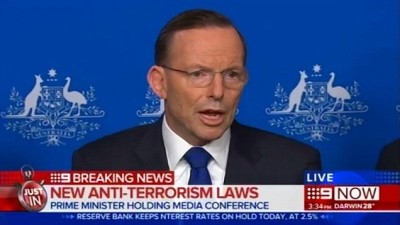The Tyrannical Mandate: Ministerial Discretion and Stripping Citizenship

“The reason why we have made this decision is because we have a very strong view: if you’ve left this country to join a terrorist army in the Middle East, we don’t want you.”[1] These were Prime Minister Tony Abbott’s words in response to the Cabinet dissent that has characterised the debate about stripping Australian citizenship from those believed (though not necessarily known) to be terrorists.
The proposal was always going to be riddled with problems. For one, it flies in the face of citizenship conventions internationally. To strip citizenship is to eviscerate a legal being, casting the individual into judicial purgatory. It assumes that an individual engaged in foreign pursuits – in this case, serving the next army that may be regarded as “terrorist” – will lose his or her Australian citizenship. It says nothing about those serving in state-based armies that are acknowledged as either allies, or states who are bonded by that uncomfortable reality that they are fighting the same threat from different sides of the aisle.
Flimsy, scatterbrained and dangerous, the proposed legislation also vests power in a minister to initiate the final, cancelling act. In what has been the greatest of legal deceptions, those defending the supremacy of parliament in the English constitutional system have argued that such figures exercise Solomon’s wisdom. Someone like the current immigration minister Peter Dutton distinctly does not possess such qualities. Few cabinet members do, and it would be unjust to expect them to.
The bill has been doing the rounds through the security channels, perused by the National Security Committee of cabinet on June 18. In the words of the finance minister, Mathias Cormann, “The Cabinet, as a matter of course delegates to the National Security Committee of Cabinet and so clearly this is now a matter for the National Security Committee to deal with before the matter, no doubt, will be considered by the party room again.”[2]
In the meantime, communications minister Malcolm Turnbull has been shooting various barbs at the proposed legislation, attempting to obtain a satisfactory response from the prime minister. The constitution, he keeps saying, cannot be compromised. Notwithstanding his portfolio, Turnbull remains one of the most seasoned of legal advocates, though his proposals to ameliorate the deficient bill have not been spectacular – taking advice, for instance, from the Solicitor General’s office.
Much of this has issued from an interpretation placed on advice from the former Independent National Security Legislation Monitor, Bret Walker SC. According to government sources, Walker had let the door open on the subject of granting the minister discretion in cancelling citizenship of terrorists.
In the words of the report, “Taking into account Australia’s international obligations, and the national security and counter-terrorism risks posed by Australians engaging in acts prejudicial to Australia’s security, the INSLM supports the introduction of a power for the Minister for Immigration to revoke the citizenship of Australians, where to do so would not render them stateless, where the Minister is satisfied that the person has engaged in acts prejudicial to Australia’s security and it is not in Australia’s interests for the person to remain in Australia.”[3]
His response, however, has been more than a touch different, eschewing the suggestions that a minister be given such quasi-judicial powers. It would rather be a matter for the minister to have the discretion once the person in question had been convicted as to how to treat the issue. This would include allowing a convicted terrorist to retain citizenship in certain cases, including instances where disruption of terrorist attacks or networks had taken place (Sydney Morning Herald, Jun 17).
Others within the Cabinet have also expressed reservations, a point that was leaked to the press three weeks ago. The foreign minister, Julie Bishop, wondered if the bill might be the subject of a High Court challenge – after all, a person’s citizenship removed in the absence of a conviction is a very smelly proposition indeed. The tyrannical mandate was not sitting well with the legal eagles. Turnbull could only observe in that regard that the process had been “botched”.
Abbott has also had to fend off Labor’s stance on the issue, which has undergone its usual self-torturous process of doubt and approval. On national security matters, the opposition has tended to be hamstrung and impotent. Its legal affairs spokesman, Mark Dreyfus, after some doubts, has argued that individuals accused of terrorism be brought back to face trial and conviction. Such comments have their own problems, but Abbott insists on giving it a decidedly peculiar spin: to make those accused of being terrorists face trial in such circumstances would be “rolling out the red carpet” for them (The Australian, Jun 19).
Abbott is all about being the hard man of Australian politics, punching, not so much above his weight as above the law when it comes to such matters. But in so doing, he has demonstrated his persistent ignorance of both law and practice. After eight hundred years, we can still see the reasons why Magna Carta has proven so utterly meaningless in the face of such stomping moves. The tyrannical mandate continues to thrive.
Dr. Binoy Kampmark was a Commonwealth Scholar at Selwyn College, Cambridge. He lectures at RMIT University, Melbourne. Email: [email protected]
Notes
[1] http://www.theaustralian.com.
[2] http://www.abc.net.au/news/
[3] http://www.smh.com.au/federal-

